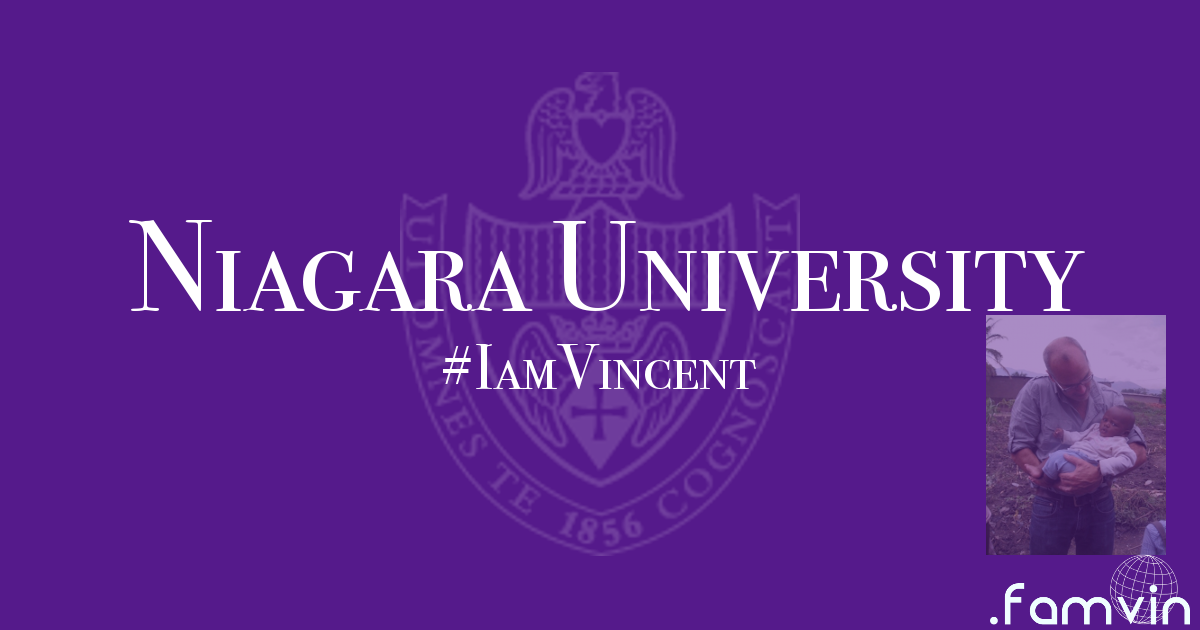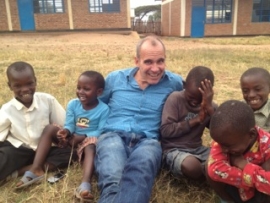
Hope sometimes is in short supply. Vincentians give many things and struggle for many things. It’s worth the struggle. This article from Niagara University (text and photos) tells it all.
It is 10 o’clock on a Monday night, and New Yorker David Loewenguth, Niagara University class of ’83, is locking up his three-speed and heading home to his studio apartment in historical Harlem. He’s spent the day going from meeting to meeting to speak with various organizations from all over the nonprofit sector. As the executive director of CHABHA (Children Affected by HIV/AIDS), this is a typical day for him, as he works to raise awareness, funds and extend CHABHA’s reach throughout the world while remaining in constant communication with staff in Rwanda and Burundi and the everyday goings-on of the organization.
 David’s journey with CHABHA began in 2008, when he was looking for an opportunity to volunteer in Africa. Up until this point, David had built a career around helping others on their career path, first as an administrator at Long Island University Southampton, and later, as an executive recruiting agent for financial corporations. But the recent passing of his brother, Peter, ’80, had given him cause to reflect on his life, and he decided to take time off work to pursue his desire to make a difference in the lives of others. A friend introduced David to Susanna Grannis, founder of CHABHA, and after meeting with her, David committed to a 10-month stay in Rwanda, CHABHA’s center of operations.
David’s journey with CHABHA began in 2008, when he was looking for an opportunity to volunteer in Africa. Up until this point, David had built a career around helping others on their career path, first as an administrator at Long Island University Southampton, and later, as an executive recruiting agent for financial corporations. But the recent passing of his brother, Peter, ’80, had given him cause to reflect on his life, and he decided to take time off work to pursue his desire to make a difference in the lives of others. A friend introduced David to Susanna Grannis, founder of CHABHA, and after meeting with her, David committed to a 10-month stay in Rwanda, CHABHA’s center of operations.
There, David was introduced to a group of young men and women heading up grassroots organizations that worked with orphans and vulnerable children. He immersed himself in programs that were currently in motion, weekly gatherings, and home visits, and helped develop systems to track graduates and their progress in the job force. He also assisted with vocational training, career development, résumé writing workshops, and identifying employers and internships for graduates in fields such as carpentry, welding, culinary arts, and sewing. As he worked, he saw the positive impact these youth-led organizations played in the well-being and psychosocial support of children traumatized by AIDS.
“What is unique is that we are working with youth that are supporting youth,” he says. “We help these youth-led organizations develop skills and sustainable programs. I am honored to witness the human spirit and the generosity of donors, these young kids, and these leaders.”
CHABHA’s model of working directly with grassroots, community-based organizations has been successful in identifying immediate needs and assessing the challenges blocking children from access to education and health. The first of these organizations, AMAHORO, was started by five teenagers who were orphaned by AIDS and heads of their households. They would gather each week to network and provide solace for their younger siblings. At one time, AMAHORO had about 250 members. Today, the group numbers more than 2,000, and many of the early members have gone on to graduate from universities, start careers, obtain jobs, and marry. They continue to give back through volunteering and mentoring the young leaders of the organization.
Since that first partnership, CHABHA has connected with three other youth-led organizations, assisting more than 3,500 children each year in Rwanda and Burundi. The needs of these orphans and vulnerable children are complicated due to poverty and their sheer numbers, but CHABHA, with partners and stakeholders, has designed sustainable activities and economic development projects for the households that give them access to education, healthcare, and psychosocial support. It has also implemented agriculture and animal husbandry projects that address child malnutrition and food security for individuals taking antiretroviral meds, and offers training sessions and workshops for the young leaders to help build their capacity.
When David came back from Rwanda in December of 2009, he knew CHABHA would always be a part of his life. In March of 2010, he was asked to take over as executive director (and has recruited his former classmate, Susan Gilesspie-Renaldo, ’83, to serve on CHABHA’s board).
“The most important thing in life, for me,” David says, “is CHABHA’s underlying mission: Every child is entitled to the most basic of human rights, independence, and above all, hope.” Together with the young leaders and CHABA’s partners, David is offering this hope to countless children living in the wake of the AIDS epidemic.
David can surely say #IamVincent.
For more information, visit www.chabha.org.





0 Comments